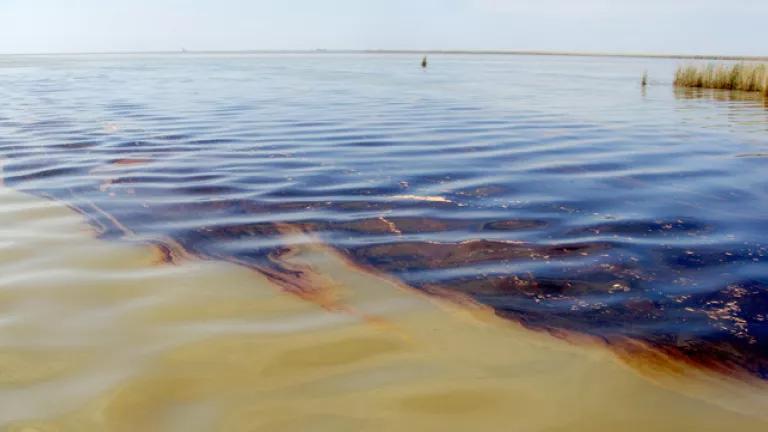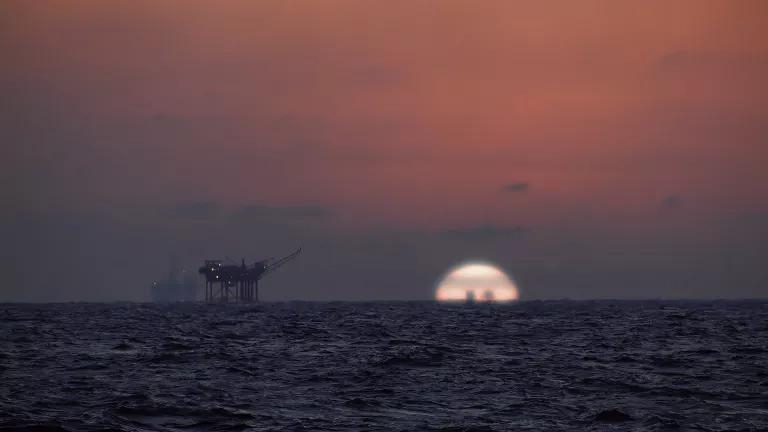Despite Climate Dangers, Offshore Leasing Continues in Gulf
This morning, the Biden administration held the largest offshore oil and gas lease sale in U.S. history. Though the Biden administration has been bold on climate in other ways, this latest action is profoundly disappointing.

This morning, the Biden administration held the largest offshore oil and gas lease sale in U.S. history by offering up almost 80 million acres of ocean to the fossil fuel industry. Though the Biden administration has been bold on climate in other ways, this latest action is profoundly disappointing. While lawsuits from oil producing states are creating pressure to move forward with lease sales, we're deeply concerned by the failure to adequately analyze and take into account fossil fuel emissions, social justice, and other environmental impacts in deciding to move forward with that sale. Even with this court ruling, the Department of the Interior has ample authority to curb oil and gas development and mitigate the worst effects of the fossil fuel industry.
Phasing out fossil fuels is key to averting the worst impacts of climate change, and was a major focus at COP26 where leaders pledged to phase out coal, oil, and gas in the strongest global consensus yet on the need to move away from fossil fuels.
The lease sale today brought in $191.7 million with thirty-three companies submitting 317 bids. The total high bids was much higher than the last sale held by the Trump Administration which brought in $121 million though the price per acre sold was less at $112 compared with $233 from last year’s auction according to BOEM. It appears that it wasn't a very competitive lease sale, with ExxonMobil grabbing around one third of all the leases and the price per acre was less than half of the last lease held under the Trump administration.
Leasing our ocean to oil and gas companies is fundamentally incompatible with U.S. and global climate and environmental justice goals. The administration should cancel the remaining lease sales and offer a five-year program with no new offshore leasing.
This sale in the Gulf of Mexico, known as Lease Sale 257, could result in the production of up to 1.1 billion barrels of oil and 4 trillion cubic feet of natural gas over 50 years - equivalent to one year’s emissions from 182 coal-fired power plants. For more on this, see our recent blog.
And the Gulf is not the only place facing new offshore oil and gas development. The administration is also preparing to hold another offshore oil and gas lease sale in Cook Inlet, Alaska, Lease Sale 258. The administration released its own analysis several weeks ago, and is opening this for public comment through December 13. Its analysis finds that the lease sale will increase greenhouse gas emissions. We believe the best way to mitigate the climate impacts is for the administration to decide to cancel the lease sale.
These lease sales would lock in fossil fuel pollution for decades to come. They are incompatible with a livable climate. Communities in the Gulf have long suffered the consequences of the fossil fuel industry. After the BP oil spill disaster, it was Gulf jobs that were lost, Gulf beaches covered in oil, and Gulf communities that bore the health impacts. The Biden administration should cancel the remaining lease sales and refuse to sacrifice this region, our ocean, and our climate to fossil fuel interests. We can’t let the fossil fuel industry win - the stakes are too high.
NRDC, alongside 30 groups, sent a letter to the administration urging it to cancel the lease sales and issue the next BOEM five-year program with no proposed leasing.
We can’t continue selling our ocean to oil and gas. The Biden administration can and must choose to cancel the remaining lease sales and offer a new five-year program with no new leasing. We need this type of bold action to protect coastal communities, the environment, and to secure a livable climate.
NRDC stands with communities in asking the Biden administration to end new leasing - the last thing we need is more offshore drilling.




